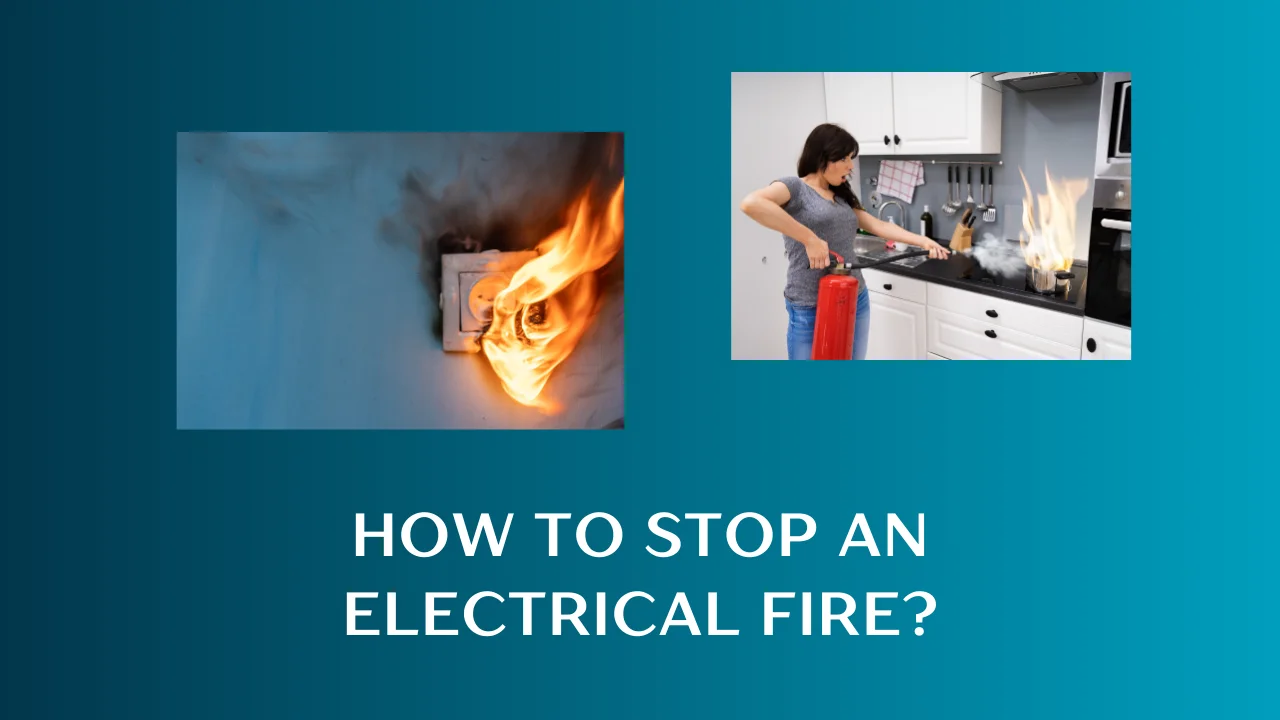Because of the special dangers and difficulties associated with electrical fires, it is essential to take measures to control and avoid them. Quick, safe responses and preventative measures to minimize risk and damage are the focus of this article as it delves into the essential steps and precautions needed to effectively stop electrical fires. This article also addresses the crucial question: How to Stop an Electrical Fire?
Who Needs This Information?
Anyone responsible for ensuring the safety of a space with electrical installations, including homeowners and office managers, can benefit from this guide. Those who aren’t firefighters but still need to know the basics of electrical system fire safety will find this guide very helpful.
Cutting Off the Power Source to Stop Electrical Fires
Immediate Power Disconnection
The first and foremost thing to do when you find an electrical fire is to turn off the power. Doing so stops the fire from drawing power from the power grid, which drastically lessens the likelihood that it will spread. Using a non-conductive material to touch any switches, locate the main breaker and turn it off immediately if it is safe to do so.
Risks of Continuing Electricity Supply
In the event of an electrical fire, leaving the power on might cause combustible materials to catch fire even more quickly. Anyone trying to put out the fire is also more likely to be electrocuted because of this. The significance of immediately turning off the electricity is highlighted by the knowledge of these dangers.
Safe Approach to Electrical Panels
It is extremely dangerous to get too close to an electrical panel in the event of a fire. If you must open the panel, do it on a dry, non-conductive surface and with tools that have insulated handles. Do not ever try to reach the panel while it is engulfed in flames or smoke.
Emergency Response Plan
This process can be accelerated and safety can be enhanced by having an emergency response plan that specifies how to turn off the electricity. Make sure everyone in the house is familiar with the breaker box’s location and how to use it properly.
Role of Backup Generators
Also, make sure that any backup generators in the building are disconnected. There is an added layer of danger when a building’s generator keeps drawing power from the main supply even after it’s turned off.
Using Class C Fire Extinguishers for Electrical Fires
Understanding Class C Extinguishers
To put out electrical fires, you need a Class C fire extinguisher. They smother the fire without posing a risk of electrical shock because they contain non-conductive extinguishing agents. In order to handle electrical fires safely, you must learn how to use a Class C extinguisher.
How to Use a Fire Extinguisher
When extinguishing a fire, follow the PASS procedure: To use, remove the pin, point the nozzle toward the fire’s base, squeeze the handle, and then sweep it from side to side. Be sure to keep your distance and leave yourself plenty of room to escape.
Limitations of Fire Extinguishers
Fires of a large or spreading nature may be beyond the capabilities of Class C extinguishers, despite their effectiveness against smaller fires. The best thing to do in these situations is to get out of the area and call 911.
Regular Maintenance and Inspection
Keep fire extinguishers in good working order by inspecting and servicing them as directed by the manufacturer. In the event of an emergency, a non-working extinguisher could fail, resulting in disastrous consequences.
Strategic Placement of Extinguishers
Make sure all occupants know where to find the fire extinguishers and put them in high-traffic areas. Keep them away from anything that could block their path or make them impossible to reach in the case of a fire.
Prevent Electrical Fire by Avoiding Outlet Overloading
Dangers of Overloaded Outlets
The most common reason electrical outlets catch fire is when they are overloaded. When you plug in too many devices at once, the outlet might overheat and set fire to any flammable materials in the vicinity.
How to Avoid Overloading
Refrain from using a multitude of power strips and limit the use of high-wattage appliances to a single outlet per strip. Another way to lower power consumption is to replace older appliances with newer, more efficient models.
Signs of Overloading
If you notice lights flickering, wall plates turning a different color, or a burning smell near the outlets, it could be an indication of overloading. These indicators necessitate swift action to reorganize authority or seek expert advice.
Using Surge Protectors
Surge protectors are useful for controlling power consumption and avoiding spikes that could start fires. But you have to pick them carefully so they can handle the load, and you have to replace them sometimes so they stay protected.
Electrical System Maintenance to Prevent Fires
Routine Inspections
Fire risks in electrical systems, such as damaged wiring or overloaded circuits, can be detected and reduced through routine inspections conducted by licensed electricians.
Upgrading Outdated Systems
In addition to being more prone to fire hazards, older electrical systems might not be up to code. You can greatly lessen the chances of an electrical fire by upgrading these systems.
Importance of Professional Services
To further reduce the likelihood of electrical fires, it is recommended to hire certified electricians for all electrical work, including installation, maintenance, and repair.
Evacuation Plan for Electrical Fire Emergencies
Developing an Effective Evacuation Plan
It is very important to have an established and regularly practiced evacuation plan in case of an electrical fire. A secure meeting place outside and numerous exits from every floor should be part of this plan. It is important to practice evacuation routes and roles on a regular basis.
Importance of Clear Signage
All areas of the building should prominently display exit signs and fire safety instructions in case of an emergency. As part of this, we have installed illuminated exit signs that will allow all occupants to see their way to safety, even in areas with heavy smoke.
Training and Awareness Programs
Everyone should have a plan in place for what to do in the event of an electrical fire, whether they are employees or family members. Among the topics covered in this training should be the warning signals of an electrical fire, the significance of turning off the power, and the proper use of a fire extinguisher.
Accessibility Considerations
Incorporating the needs of all people, including those with disabilities, into evacuation plans is essential for their inclusivity. In the event that some people will need more assistance during the evacuation, plans should be in place to provide it.
Importance of Smoke Detectors in Electrical Fires
Early Detection Through Smoke Detectors
If an electrical fire were to break out, smoke detectors would serve as an early warning system, giving people time to take precautions or evacuate the building. Place smoke detectors in high-traffic areas like bedrooms, kitchens, and hallways, and check them often.
Interconnected Smoke Alarm Systems
A complete warning system that notifies everyone in the building, regardless of their location, is provided by using interconnected smoke detectors. This ensures that when one alarm sounds, all alarms in the building do the same.
Maintenance and Testing
To make sure they work when it matters most, smoke detectors must be serviced and tested regularly. Detectors should be tested once a month by pressing the test button, and batteries should be replaced once a year or as instructed by the manufacturer.
Choosing the Right Smoke Detectors
Smoke detectors come in a variety of styles, with ionization and photoelectric models being two of the most common. To find the one that’s right for your space and needs, talk to a fire safety expert.
Emergency Services for Electrical Fire Situations
When to Call Emergency Services
In the event that a fire involving electricity cannot be put out using a fire extinguisher or if the fire is spreading quickly, it is critical to contact emergency services without delay. Make sure everyone knows that this call could save lives if they don’t delay.
Coordinating with Local Fire Departments
Improving response time and effectiveness during emergencies can be achieved by establishing a relationship with local fire services. Sharing evacuation plans and having fire officials oversee reviews and drills on a regular basis are two possible steps in this direction.
Access for Emergency Responders
Make sure that in the event of an emergency, emergency services can easily reach your property. Make sure there are no obstacles in the way of entrances or driveways, and mark all access points and addresses clearly.
Handling Electrical Fires with Non-Conductive Chemicals
Using Non-Conductive Chemicals Safely
Class C fire extinguishers, which contain chemicals that are not electrically conductive, are suitable for use on electrical fires. You won’t have to worry about getting electrocuted because they don’t conduct electricity.
Types of Non-Conductive Extinguishing Agents
Carbon dioxide and dry chemical powders are two common examples of non-conductive extinguishing agents that can suffocate fires without endangering electrical equipment or creating safety hazards.
Training on Extinguisher Use
These extinguishers must be used according to the instructions provided. Everyone in the home or office needs to be familiar with the location and proper use of fire extinguishers.
FAQs
What immediate steps should I take if I see an electrical fire?
Immediately cut off the power if it’s safe to do so, use a Class C fire extinguisher, and call emergency services.
Can water be used on an electrical fire?
No, never use water on an electrical fire as it conducts electricity and can lead to electrocution.
How often should I check my electrical installations?
Electrical installations should be inspected at least once every three years by a certified electrician.
What should I do if I can’t access the breaker box during a fire?
Evacuate immediately and inform the emergency services that the power has not been disconnected.
Are smoke detectors effective in detecting electrical fires?
Yes, smoke detectors can provide an early warning, allowing crucial time to react and evacuate.
Conclusion
Preventing and putting out an electrical fire takes more than just acting quickly in an emergency; it also necessitates being well-informed and taking proactive measures. How to Stop an Electrical Fire? You can greatly lessen the chances of electrical fires by learning about and following safety procedures like having working smoke detectors and evacuation plans, keeping electrical systems in good repair, and using the right fire extinguishers. Ensuring the safety and security of all occupants can be achieved through regular training and awareness, which empower individuals to effectively handle potentially devastating situations. Always keep in mind that a little planning now can save a lot of trouble later.

Shannon Reyes is a seasoned writer with a knack for crafting engaging blogs on a variety of service industries, including plumbing, cleansing, moving, pest control, and roofing. With a keen eye for detail and a passion for helping readers navigate complex topics, Shannon brings her expertise to life through informative and accessible content.












Your point of view caught my eye and was very interesting. Thanks. I have a question for you.
Your article helped me a lot, is there any more related content? Thanks!
Can you be more specific about the content of your article? After reading it, I still have some doubts. Hope you can help me.